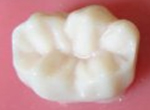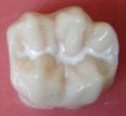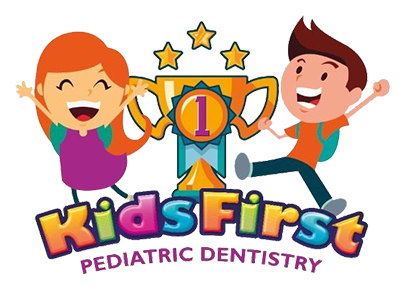Early Dental Care
Prenatal Counseling
 Prevention starts with education. Prenatal counseling by the OB/GYN and pediatric dentist involves discussing:
Prevention starts with education. Prenatal counseling by the OB/GYN and pediatric dentist involves discussing:
- Parents own oral hygiene practices and their effect as role models.
- Conditions in pregnancy, such as pregnancy gingivitis and caries risk.
- Infant dental care and recommendations for first dental visit.
- Dietary habits, medications, fluoride availability and parental attitudes.
Infant's New Teeth and Initial Bacterial Colonization
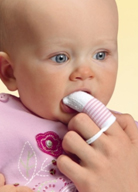 With the eruption of the first teeth, colonization of caries participating bacteria begins on the surfaces of the teeth. The teeth should be cleaned daily, beginning at the time of eruption, to disrupt the establishment of mature colonization of harmful bacteria. Because it is believed that many oral bacteria are transmitted from those with the most contact (usually the mother), it is recommended that she reduce the number of harmful bacteria in her own mouth through excellent oral hygiene and caries excavation/restoration, thus infecting the child "less severely."
With the eruption of the first teeth, colonization of caries participating bacteria begins on the surfaces of the teeth. The teeth should be cleaned daily, beginning at the time of eruption, to disrupt the establishment of mature colonization of harmful bacteria. Because it is believed that many oral bacteria are transmitted from those with the most contact (usually the mother), it is recommended that she reduce the number of harmful bacteria in her own mouth through excellent oral hygiene and caries excavation/restoration, thus infecting the child "less severely."
Until the child can properly care for his/her own oral hygiene (approximately at age 6 or 7 years-old), it is important for the parent/caregiver to perform the oral hygiene home care to assure proper cleaning and proper teaching of brushing techniques to the child. Before the age of 6 or 7 years old, the child is too young to be given complete responsibility to clean his/her teeth and cannot do so effectively.
Regular Dental Visits
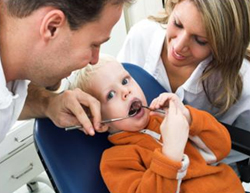 The American Academy of Pediatric Dentistry recommends the first dental visit within 6 months of the eruption of the first tooth or by 12 months of age. The primary reasons for this initial visit are:
The American Academy of Pediatric Dentistry recommends the first dental visit within 6 months of the eruption of the first tooth or by 12 months of age. The primary reasons for this initial visit are:
- To establish a dental home for the child
- To acquire comprehensive medical/birth history
- To perform an extra oral and intraoral exam
- To access fluoride exposure, dietary habits, and other risk factors
- To counsel the parents on the importance of dental health and their part in achieving that for their child, to thoroughly teach oral hygiene home care, and to counsel the parents on proper dietary habits
- To begin a child-specific dental recare program
Proper Dietary Habits
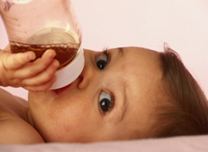 Normally, the first tooth erupts between ages 6 to 12 months. Gums are sore, tender and sometimes irritable until the age of 3. Rubbing sore gums gently with a clean finger, the back of a cold spoon or a cold, wet cloth helps soothe the gums. Teething rings work well, but avoid teething biscuits - they contain sugar that is not good for baby teeth.
Normally, the first tooth erupts between ages 6 to 12 months. Gums are sore, tender and sometimes irritable until the age of 3. Rubbing sore gums gently with a clean finger, the back of a cold spoon or a cold, wet cloth helps soothe the gums. Teething rings work well, but avoid teething biscuits - they contain sugar that is not good for baby teeth.
While your baby is teething, it is important to monitor the teeth for signs of baby bottle decay. Examine the teeth, especially on the inside or tongue side, every two weeks for dull spots (whiter than the tooth surface) or lines. A bottle or "sippy cup" containing anything other than water and left in an infant's mouth while sleeping can cause decay. This happens because sugar in the liquid mixes with bacteria in dental plaque, forming acids that attack the tooth enamel.
Fluoride
Fluoride helps teeth become stronger and resistant to decay. Most commonly, fluoride is applied topically to the teeth using gels, varnishes, toothpaste or mouth rinses. Systemic delivery involves fluoride supplementation using water, tablets and others. Dentists can evaluate the level of fluoride in a primary drinking water source and recommend fluoride supplements if necessary. Fluoride varnishes can prevent or reverse mineral lost from the enamel in children with moderate to high caries risk. Fluoride varnishes and fluoride-releasing restorative and bonding materials have been shown to be beneficial and are best utilized as part of a comprehensive preventive program in the "dental home."
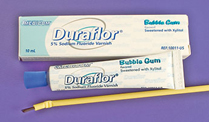
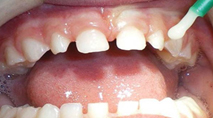
Sealants
The grooves and depressions that form the chewing surfaces of the back teeth are extremely difficult to clean. Sealant material is a resin typically applied to protect these susceptible areas. It lasts for several years but needs to be checked during regular appointments.
